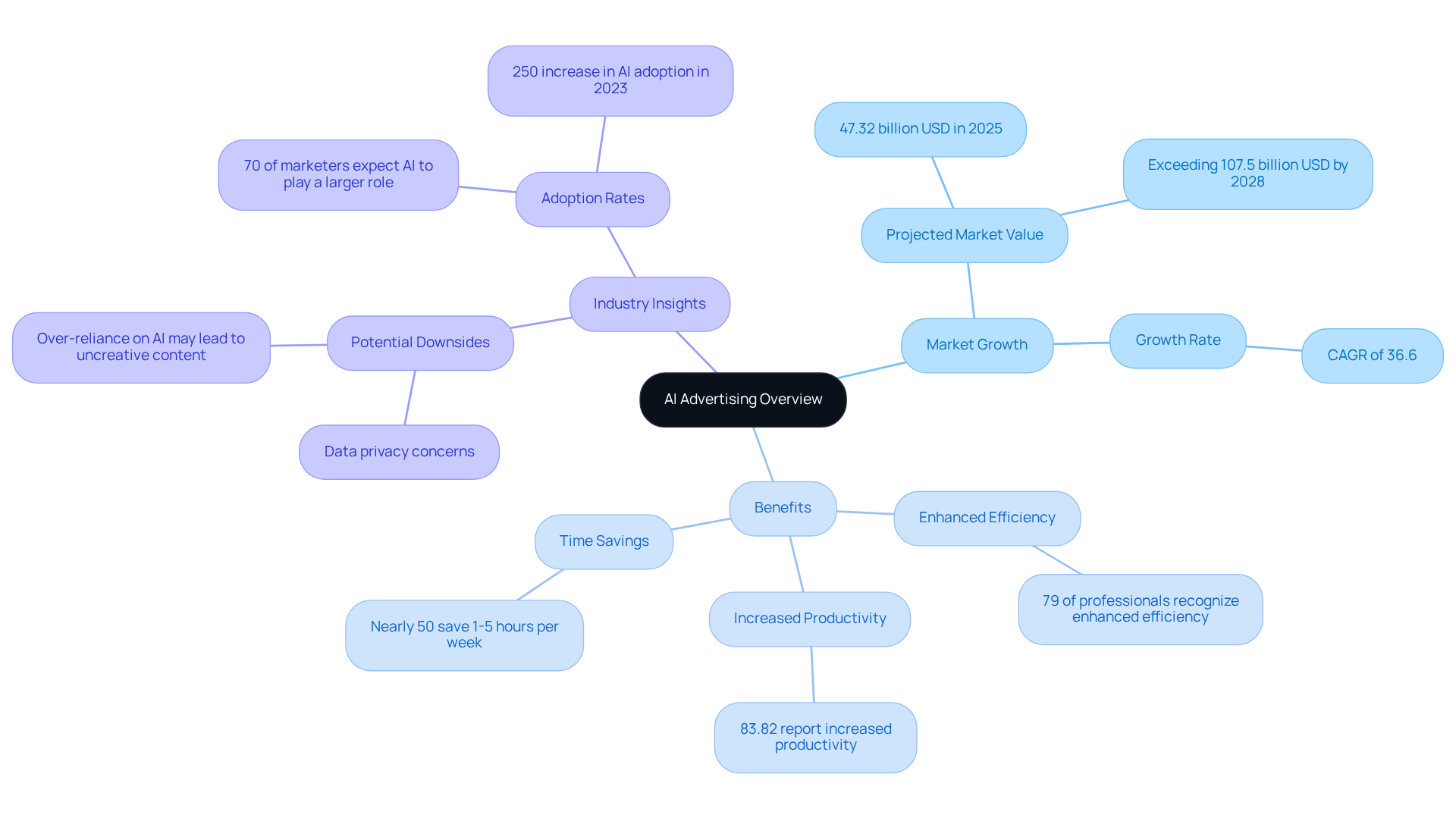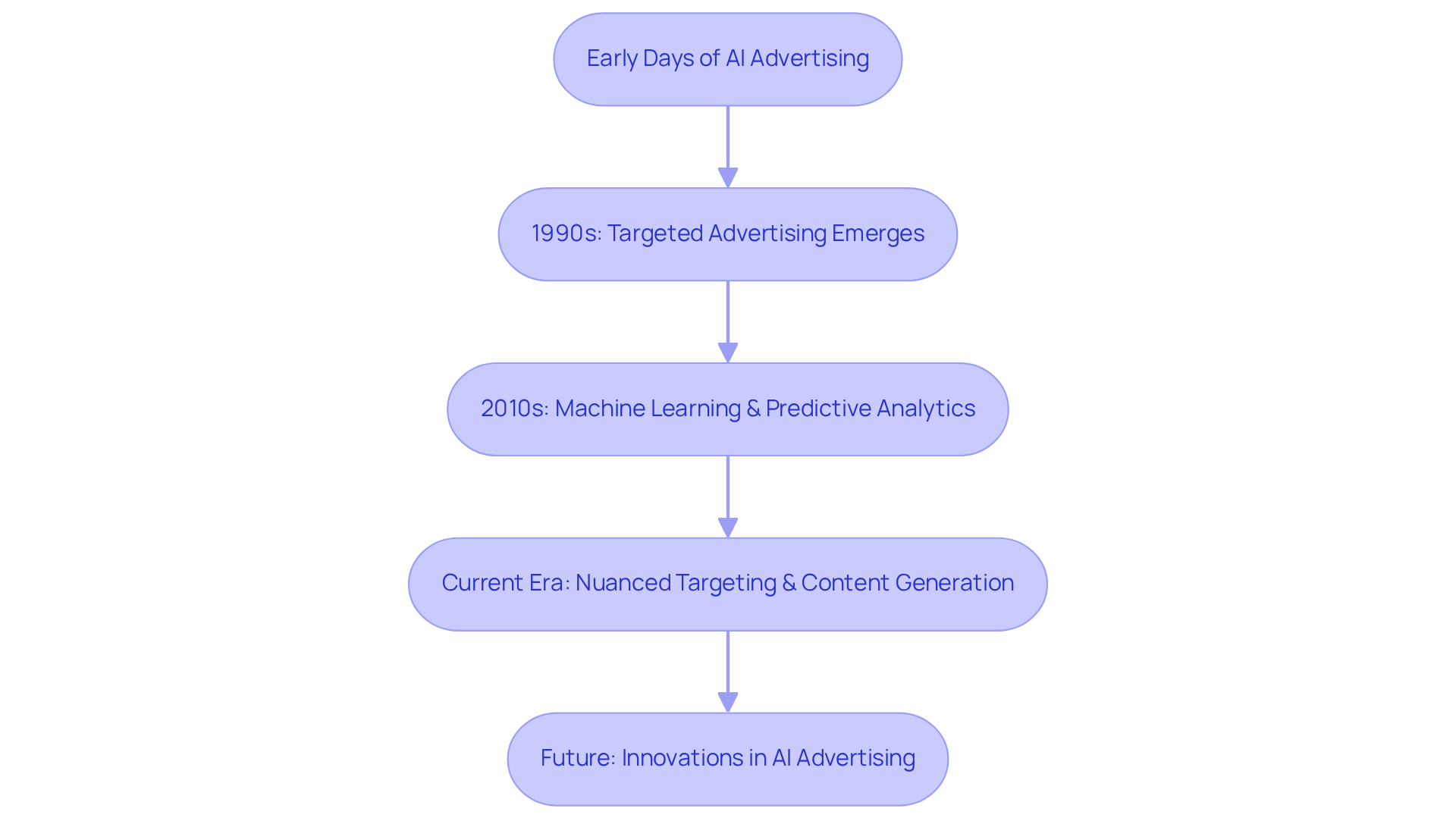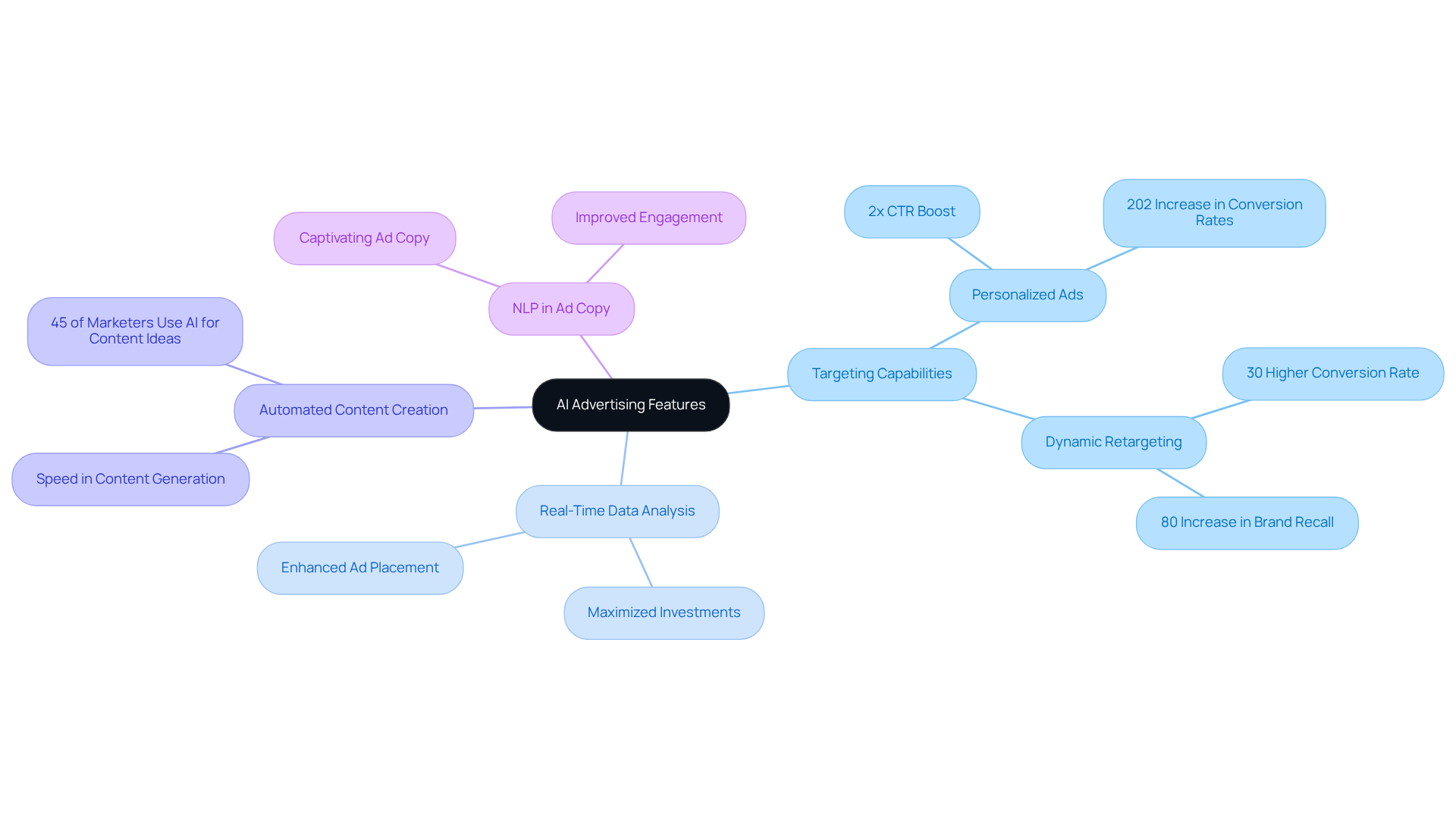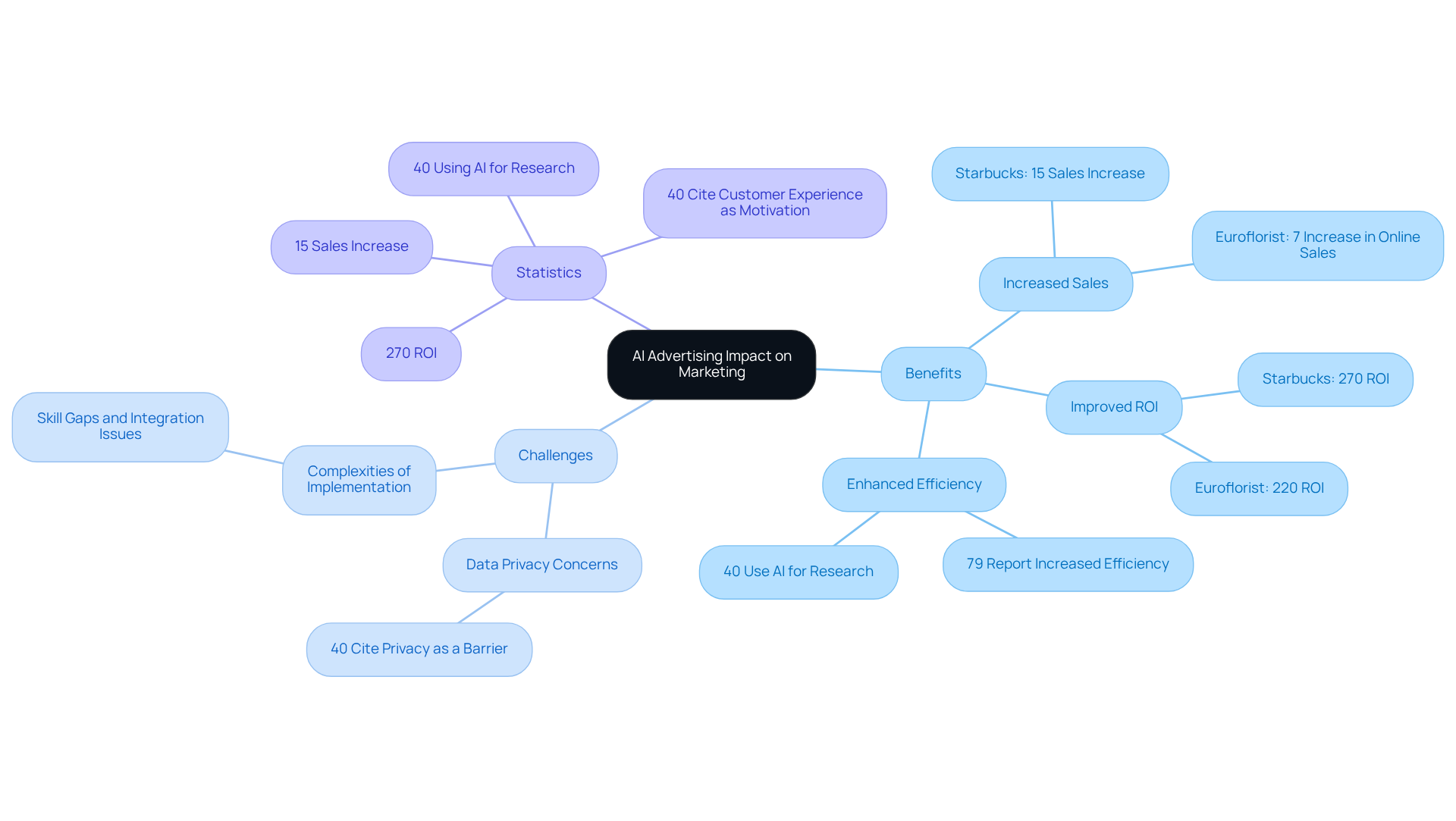Overview
In the ever-evolving landscape of marketing, many professionals find themselves grappling with the limitations of traditional advertising methods. The challenge lies in effectively reaching and engaging consumers amidst an overwhelming sea of information. This struggle can lead to frustration and missed opportunities, impacting the overall success of marketing efforts.
However, there is hope. AI advertising has emerged as a transformative solution, offering advanced targeting, real-time data analysis, and automated content creation. These innovations not only enhance marketing effectiveness but also foster deeper connections with consumers. As we explore this evolution, we see the positive impact it has had on many marketing professionals who have embraced these changes.
Statistics reveal significant market growth, showcasing the benefits recognized by those who have integrated AI into their strategies. For instance, numerous case studies highlight successful AI implementations that have revolutionized how brands connect with their audiences. These examples serve as a testament to the power of AI in modern marketing strategies, illustrating a path forward for those seeking to overcome their advertising challenges.
By embracing AI, marketing professionals can navigate the complexities of today’s digital landscape with confidence. This journey not only enhances their marketing efforts but also cultivates a more meaningful engagement with consumers. Together, we can explore these advancements and support one another in harnessing the potential of AI for a brighter marketing future.
Introduction
In a world where the clamor of digital noise often drowns out marketing messages, many brands find themselves struggling to connect with their audiences. This can be a frustrating experience, as the desire to reach consumers feels increasingly out of reach. Yet, the rise of AI advertising shines as a beacon of hope for these brands. By leveraging artificial intelligence, marketers have the opportunity to streamline their strategies and create personalized experiences that resonate deeply with consumers.
As the industry rapidly approaches a projected valuation of over $40 billion by 2024, it’s natural to wonder:
- How can brands effectively harness this technology?
- What challenges might they face along the way?
Exploring the evolution, features, and impact of AI advertising reveals a landscape rich with opportunities and complexities. Together, we can navigate this journey, turning challenges into stepping stones towards meaningful connections.
Define AI Advertising: A Comprehensive Overview
In today's fast-paced digital landscape, many marketers face the challenge of effectively reaching their audience amidst overwhelming competition. Traditional marketing methods often fall short, leading to frustration and missed opportunities. This is where AI advertising comes into play, offering a nurturing solution that can transform promotional processes. By harnessing artificial intelligence technologies, marketers can enhance and automate their strategies, utilizing machine learning algorithms and data analytics to optimize ad targeting, content creation, and campaign management.
Imagine being able to analyze extensive datasets effortlessly, enabling you to deliver personalized and relevant ads that resonate with your audience. This not only improves engagement but also significantly boosts conversion rates. As we look towards 2025, the AI in marketing market is projected to reach a remarkable valuation of 47.32 billion US dollars, with a growth rate of 36.6% expected to continue, potentially exceeding 107.5 billion dollars by 2028. This swift growth underscores the increasing reliance on AI tools, with more than half of professionals already using AI to enhance their content for email campaigns and SEO.
The benefits of implementing AI advertising in campaigns are substantial. A significant 79% of advertising professionals recognize that enhance efficiency as the primary advantage, while nearly 75% believe that AI provides a competitive edge. For instance, 26% of B2B professionals using chatbots have reported a 10-20% increase in leads, showcasing the effectiveness of AI-driven solutions in fostering customer engagement. Furthermore, 83.82% of marketers who have adopted AI advertising report increased productivity, further validating the positive impact of AI on marketing effectiveness.
Looking ahead, 85.84% of industry experts plan to increase their use of AI technologies in the coming years. Yet, it’s crucial to remain mindful of potential downsides, such as data privacy concerns that may arise with greater AI adoption. As companies adapt to the evolving digital landscape, the strategic application of AI advertising will be essential for achieving sustainable growth and optimizing return on investment.
At RNO1, we stand as a leader in branding and digital design, exemplifying innovative performance strategies that empower brands to seamlessly integrate AI advertising into their promotional efforts. Together, we can transform , evolving from mere vendors to collaborative partners in your digital growth journey. We understand the challenges you face, and we’re here to support you every step of the way.

Trace the Evolution of AI Advertising: From Concept to Implementation
The journey of AI advertising in digital marketing highlights a common challenge that many tech startup founders encounter: navigating an ever-evolving landscape. In the early days, basic algorithms offered limited insights, leaving many feeling overwhelmed by data analysis. As the internet blossomed in the 1990s, the potential for targeted advertising emerged, yet the complexity often heightened anxiety about reaching the right audience. With the advent of machine learning and predictive analytics, AI advertising provided a glimmer of hope, promising more . By the 2010s, the emergence of AI technologies like natural language processing and computer vision began to transform this landscape, facilitating AI advertising through more nuanced ad targeting and content generation. Today, as we embrace AI advertising, we find ourselves at a pivotal moment filled with possibilities—from programmatic buying to personalized content delivery. This evolution is not just about technology; it fundamentally reshapes how brands connect with consumers. Significant milestones, such as automated bidding systems and AI advertising insights, have collectively transformed the marketing landscape, offering solutions that resonate with both brands and their audiences. As we look to the future, the integration of AI advertising in marketing continues to grow, promising even greater innovations. Together, we can navigate this exciting journey, fostering deeper connections with our audiences and embracing the supportive community that RNO1 offers.

Examine Key Features of AI Advertising: Technologies and Techniques
In today's fast-paced digital landscape, many tech startup founders grapple with the challenge of effectively reaching their target audiences. It can be disheartening to see marketing efforts fall flat, especially when the potential for connection is so great. This is where AI advertising shines, offering advanced targeting capabilities, real-time data analysis, and automated content creation that can transform your approach.
Imagine being able to analyze user behavior and preferences effortlessly. Machine learning algorithms make this possible, enabling you to deliver personalized ads that truly resonate. Did you know that personalized ads can achieve a click-through rate (CTR) boost of up to 2x compared to generic ads? This significant enhancement in engagement can make a world of difference for your startup. Proven strategies can further elevate CTR to as high as 1.59%, providing valuable insights into how to improve your ad performance.
Moreover, AI advertising tools optimize ad placements and budgets in real-time, ensuring you maximize your investments. For instance, dynamic retargeting ads can drive a conversion rate that is 30% higher than standard ads, while retargeted ads can increase brand recall by an impressive 80%. This showcases the remarkable power of AI advertising in enhancing your marketing campaigns. Techniques like programmatic promotion automate the buying and selling of ad space, streamlining the process and allowing for precise targeting that can alleviate some of the burdens you face.
Natural language processing (NLP) also plays a vital role in crafting captivating ad copy. It’s heartening to know that 45% of marketers are utilizing AI to generate content ideas, further amplifying the impact of their promotional efforts. As we look ahead to 2025, projections indicate that 90% of digital ads will utilize AI advertising to be dynamically personalized. This underscores the to meet the evolving demands of consumers. Additionally, the growth of AI advertising is anticipated to surpass $40 billion by 2024, highlighting its rising significance in the promotional landscape.
Together, these attributes not only promise improved outcomes for your brand but also establish AI advertising as an essential ally in the future of marketing. Embracing these advancements can empower you to connect more meaningfully with your audience, ultimately nurturing the growth of your startup in an ever-changing environment.

Analyze the Impact of AI Advertising on Modern Marketing Strategies
Many brands today face significant challenges with AI advertising. As companies strive to connect with consumers, the complexities of hyper-personalization and data-driven strategies can feel overwhelming. It's crucial to understand how these advancements can both benefit and complicate marketing efforts. For instance, while Starbucks has successfully utilized AI to deliver personalized recommendations, achieving a remarkable 15% increase in sales and a 270% ROI within the first 18 months of implementing Deep Brew AI, not every brand experiences such smooth transitions. Similarly, Euroflorist's led to a 7% increase in online sales within just three months, yet many others grapple with the intricacies of these technologies.
The heart of the issue lies in the vast amounts of consumer data that advertisers must navigate. Almost 40% of advertisers turn to AI advertising for research, hoping to improve campaign quality, while another 40% cite AI advertising's impact on customer experience as their main motivation for adopting it. However, this rise in AI-driven promotion also raises valid concerns about data privacy and the ethical implications of these technologies. Approximately 40% of advertising professionals acknowledge data privacy as a significant barrier to AI adoption, emphasizing the need for responsible practices in this evolving landscape.
As brands face these challenges, it's essential to recognize that the journey of integrating AI advertising into promotional strategies requires careful consideration. By 2025, the anticipated influence of AI on return on investment is expected to be profound, with 79% of professionals identifying enhanced efficiency as the main advantage of these solutions. Furthermore, an impressive 85.84% of marketing professionals plan to increase their use of AI technologies in the coming years. This underscores the importance of balancing innovation with ethical considerations, ensuring sustainable growth in the digital landscape.
Navigating the complexities of AI advertising can be daunting, but it’s a journey worth taking. By fostering a community that emphasizes both technological advancement and ethical responsibility, we can support one another in creating a more effective and compassionate marketing environment.

Conclusion
The exploration of AI advertising highlights a significant challenge in the marketing landscape: how brands can effectively engage with consumers amidst rapid technological changes. This transformation, while promising, can feel overwhelming. Marketers are tasked with leveraging advanced technologies to enhance targeting precision, automate content creation, and optimize campaigns. These efforts aim to improve engagement and conversion rates, yet the pressure to stay competitive and relevant can weigh heavily on brands.
As we reflect on the evolution of AI advertising, it's essential to acknowledge the rapid advancements in machine learning, natural language processing, and real-time data analysis. These developments are not just statistics; they represent a shift that many professionals are experiencing firsthand, often reporting increased productivity and efficiency. However, this journey is not without its hurdles. Concerns surrounding data privacy and the ethical implications of AI adoption are real and must be navigated with care and compassion.
Ultimately, embracing AI advertising transcends merely adopting new technologies; it’s about fostering deeper connections with your audience while upholding ethical standards. As we look towards 2025, it’s a time for brands to prioritize innovative and responsible practices in their marketing strategies. By doing so, you can unlock the full potential of AI advertising, ensuring sustainable growth and a meaningful impact in an increasingly digital world. Remember, you are not alone in this journey; together, we can navigate these changes with empathy and understanding.
Frequently Asked Questions
What is AI advertising?
AI advertising refers to the use of artificial intelligence technologies to enhance and automate marketing strategies, including ad targeting, content creation, and campaign management.
How does AI advertising improve marketing effectiveness?
AI advertising improves marketing effectiveness by analyzing large datasets to deliver personalized and relevant ads, which enhances engagement and significantly boosts conversion rates.
What is the projected market value of AI in marketing by 2025?
The AI in marketing market is projected to reach a valuation of 47.32 billion US dollars by 2025, with a growth rate of 36.6% expected to continue, potentially exceeding 107.5 billion dollars by 2028.
What percentage of advertising professionals believe AI enhances efficiency?
A significant 79% of advertising professionals recognize that AI advertising technologies enhance efficiency as the primary advantage.
How effective are AI-driven solutions like chatbots in generating leads?
Approximately 26% of B2B professionals using chatbots have reported a 10-20% increase in leads, highlighting the effectiveness of AI-driven solutions in fostering customer engagement.
What do marketers report about productivity after adopting AI advertising?
About 83.82% of marketers who have adopted AI advertising report increased productivity.
What are the future plans of industry experts regarding AI technologies?
Approximately 85.84% of industry experts plan to increase their use of AI technologies in the coming years.
What are some potential downsides of AI advertising?
Potential downsides of AI advertising include data privacy concerns that may arise with greater adoption of AI technologies.
How can RNO1 assist with AI advertising?
RNO1 helps brands integrate AI advertising into their promotional efforts, supporting them through innovative performance strategies and transforming their marketing approach.




